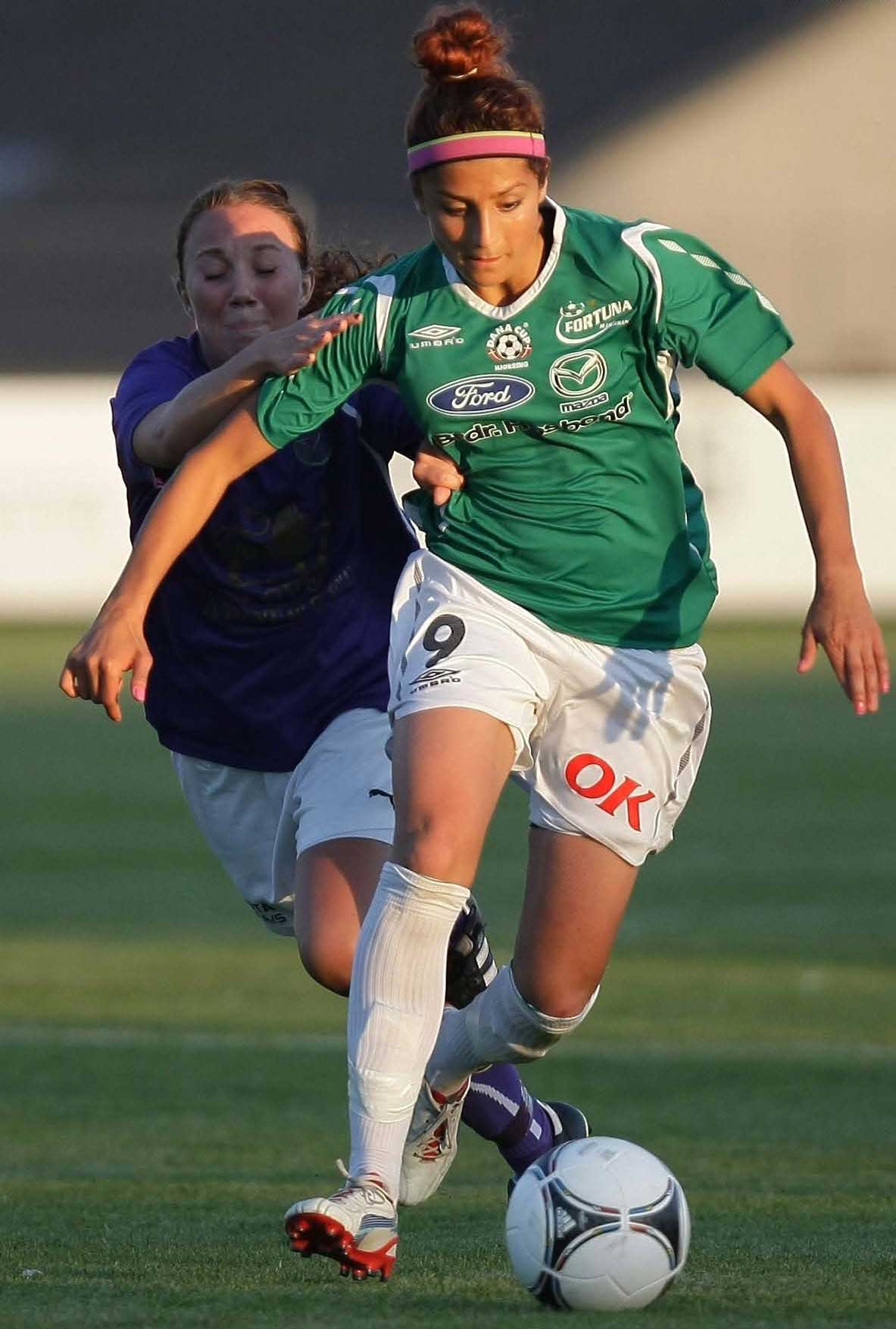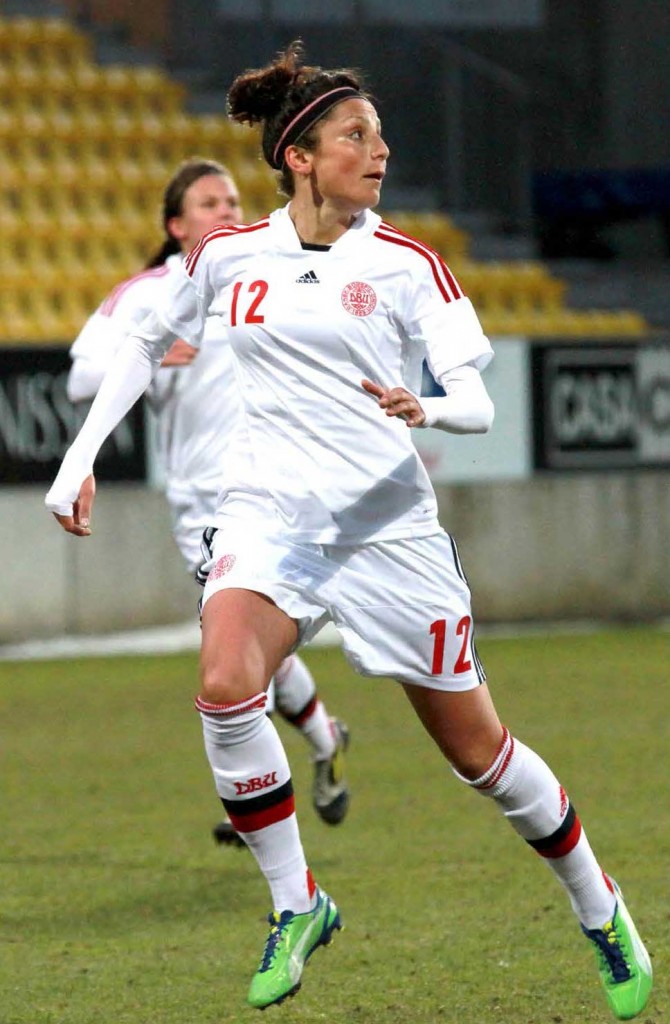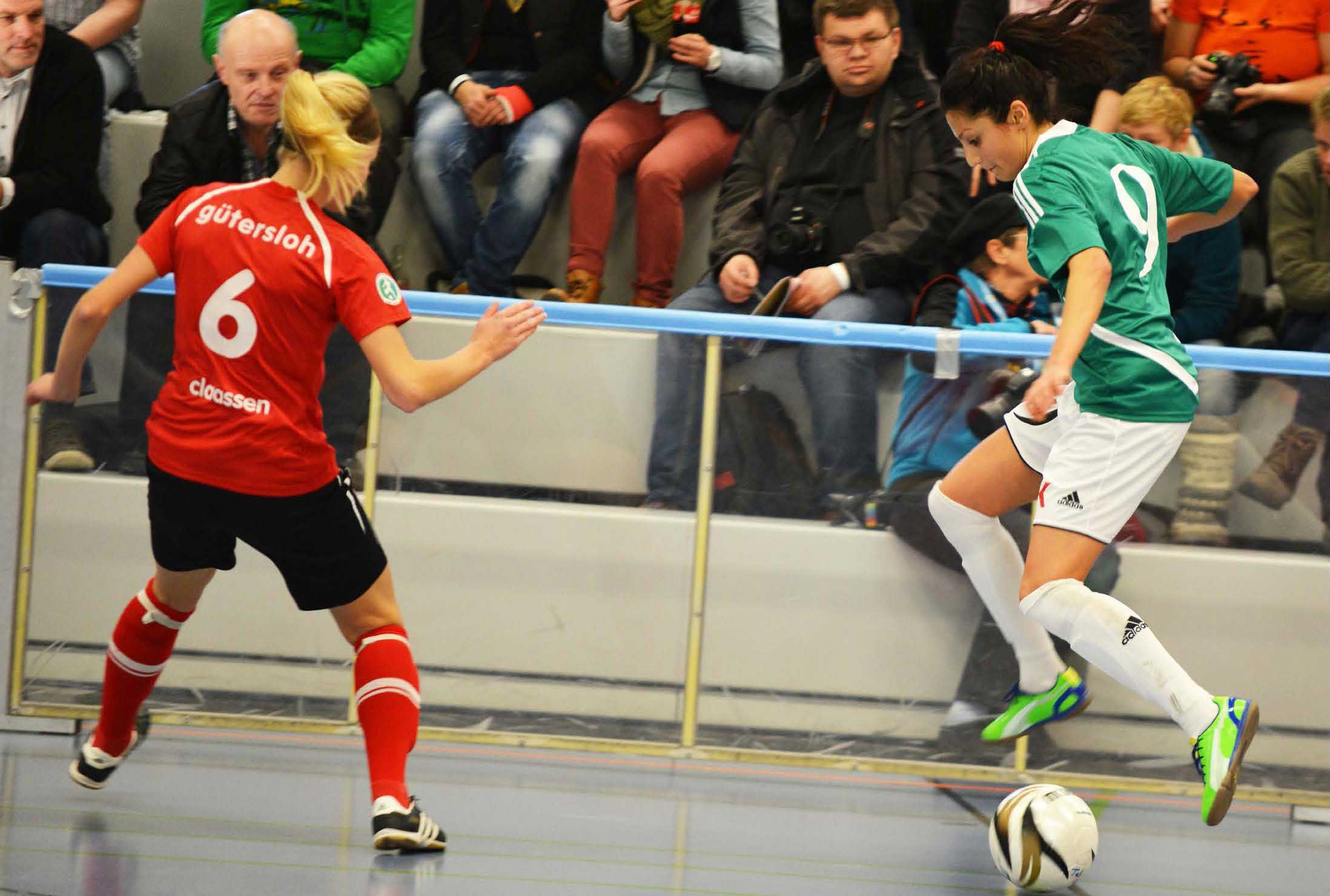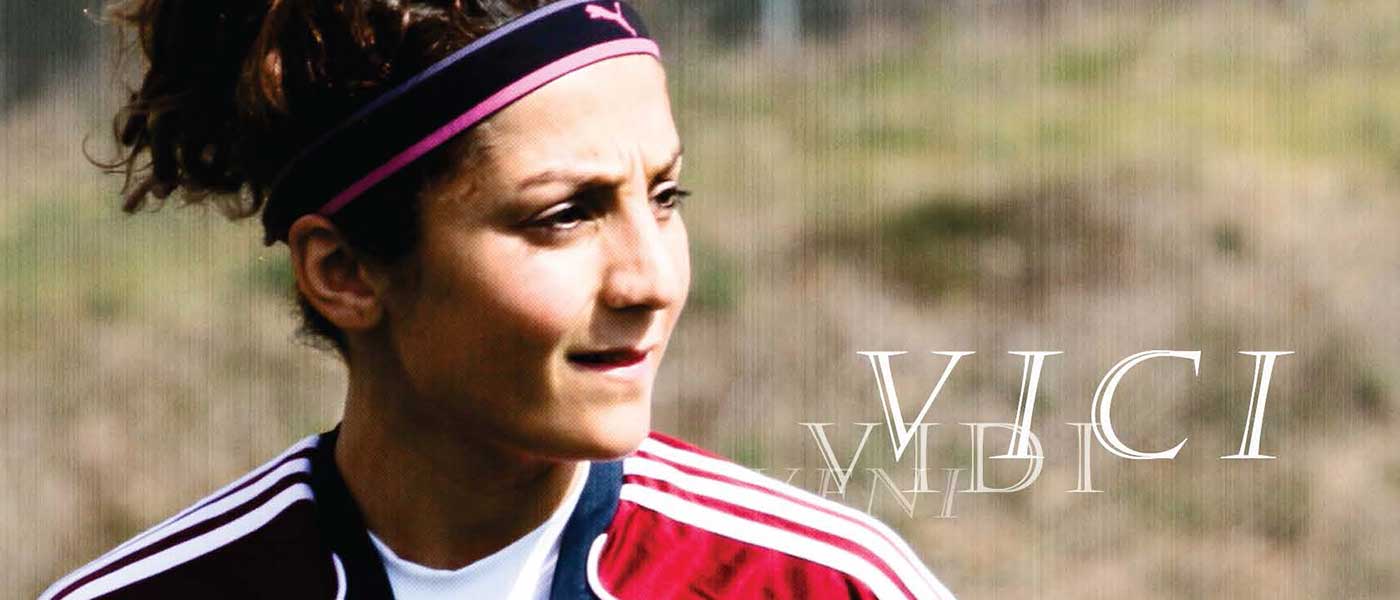Editor’s note — This article originally appeared in the June 2013 print edition of Our Game Magazine. Nadim now plays for Sky Blue FC of the National Women’s Soccer League. Sky Blue kicks off its season on April 12, 2015.
“Veni, Vidi, Vici,” was written on her arm in magic marker.
I asked her, “Would you ever get a tattoo?”
“No, my mom would kill me,” she said.
“So, what does that mean?”
“Julius Caesar said it. It means ‘I came, I saw, I conquered.’”
Nadia Nadim was born on Jan. 2, 1988, in Herat, Afghanistan, one of five girls in her family. She lived in Kabul, Afghanistan with her mother Hamida, father Rabena Khan, and four sisters Giti, Diana, Muskan, and Mujda. The family moved frequently when the girls were young because Rabena Khan was in the military.
A hard-working, intelligent pair, Hamida and Rabena Khan lived a life of high expectations, pushing the limits and trying to lead better lives for themselves and their children.
“I don’t remember a specific dream I had when I was living in Afghanistan, but I always knew I wanted to be successful,” said Nadim.
The idea of being successful wasn’t something she saw on TV or read in newspapers — she had impressive role models to inspire her.
“My dad was a military general. The guy loved his job and his country,” said Nadim, now 25 years old. “And my mom was a principal of the school and everything was how it should be.”
During the late 1990s, Afghanistan was at war with itself. The Taliban, an Islamic fundamentalist political group, seized Kabul and established the Islamic Emirate of Afghanistan as it attempted to overtake the country.
“I don’t remember a time when there was peace in the country, but not many do,” said Hamida. “Even before the Taliban, there was always war in Afghanistan. It seems it’s never going to end because people are so different. The struggle for power will never end.”
The Taliban would change Afghanistan in ways that Western society could not imagine. The rules of sharia law were implemented as a result of the Islamic Emirate of Afghanistan and it was extreme. Women weren’t allowed to go to school, work or even be alone outside. They had to be entirely covered with a burka, with only their eyes showing. They were not allowed to see male doctors unless a male chaperoned them, and if laws were broken, women were executed.
“My dad’s friends told him to leave the country, and said to him, ‘Even though you didn’t do anything wrong, they don’t see you like that.’ But he loved his country so much, so we stayed,” she said.
“The Taliban was afraid that my dad had too much influence as a general. They were afraid of influential people in the country. And then influential people started to disappear.”
“One day he was called to meet with one of the ministers,” she said looking down for the first time during the conversation. “He was driven to that area and the driver was waiting for him to return… but he never came out.”
That was the last time anyone ever saw Rabena Khan. Nadim lost her father when she was just nine years old.
“I can’t remember much, but the whole thing happened fast, it was chaotic,” she said. “My mom always tried to protect us from everything. But she never sat down and talked about it with us. So I was confused. But when I saw my mom crying, I felt worse for her than for myself because I didn’t know how to react.”

Since there was no longer a man in the family, and with the strict rules implemented by the Taliban on women, there was only one choice for the Nadim family: They had to get out of Afghanistan.
“In Muslim tradition, when the husband dies, the husband’s brother is supposed to marry the woman,” said Hamida. “But I was an educated woman, I knew the difference between what’s right and wrong and what is religion and that’s why I never forced religion onto my kids. Most of the stuff you read in the media is exaggerated, but a lot of women in Afghanistan are not educated so they accept these as social norms.”
The Nadim family wasn’t alone in their endeavor to leave the country under these circumstances.
Afghanistan was, and still is, one of the world’s most dangerous countries to live in, which in turn has led to massive numbers of people seeking refuge elsewhere. There are nearly 3 million Afghan refugees living throughout the world according to the United Nations High Commission for Refugees (UNHCR). Of those
3 million, 95 percent live in Pakistan or Iran.
“We were fortunate enough to have the money to do this,” said Nadim. “My father had a good paying job. So we had to drive to Pakistan and escape the country.” Nadim had family in London, so that would be their destination. The only way to London was through Jinnah International Airport in Karachi, Pakistan. The only way through Pakistan was to pretend they were Pakistani and pay for people to believe it.
“It was so weird in the airport,” she said. “I was eleven years old at the time, but I remember everyone watching us, like everyone knew we weren’t Pakistanis, but they were letting us go through with fake passports and fake Pakistani outfits. It was crazy.”
First Stop: Italy. With their entire lives packed in bags and suitcases, they had no idea where they were at any given moment, but the plane landed and they were on the move. From Italy, Hamida and her five young daughters packed themselves into a cargo truck where they spent several days and nights unable to make a sound for fear of being caught.
“We were even scared to eat because we didn’t even have somewhere to go to the bathroom.”
Finally, one day, the truck stopped, but the expectations they had for a city like London weren’t quite met.
“I was like, ‘Damn, I thought London was bigger,’” she said. “But we saw a man and asked him where we were, and he said ‘Denmark.’”
The small town they landed in was called Randers. And it was during Easter weekend, which in Denmark meant the town was practically shut down. Luckily for them, a police station was nearby and a man was willing to help the family.
“The police officer asked if we had eaten something and he drove us to a small kiosk and bought us toast, milk and bananas and then bought us tickets for the train to Copenhagen. This guy was an angel. I would like to thank him but I can’t remember his face, but just that he was a kind-looking guy.”
From here, the family had to establish a way to stay in Denmark, though seeking asylum as refugees took a long time. Hamida accurately told their story enough times to convince the Danish government that her husband was a military general that was murdered in Afghanistan.
Asylum seekers, as they are called, need a place to stay while in the limbo phase of requesting refuge. Asylums provide food, clothing, housing and school for families during this difficult time.
The time spent at the asylum would have a profound impact on the Nadim women and would ultimately reroute their entire lives.
“The school was not that good because there were so many kids that were different ages from places that spoke different languages,” she said. “Most of the time we just sang songs we didn’t know the words to and played outside.”
Since Hamida was a teacher in Afghanistan, she had taught them a lot already. All of her children were really good at math, and since that didn’t require much of a language change, it was easily carried over to school in Denmark.
After a little less than a month, they were transported to another asylum near Aalborg called Visse. There, they would wait almost six months for their answer.
“It was an awesome time at the asylum for us. But for my mom, it was a tough time for her, because she was thinking about the result of the answer. There was the chance we might not stay there, but we didn’t think about that. We were just going to school and being kids.”
“I felt safe for the first time in a very long time,” said Hamida. “I felt free. I could sleep without being afraid of a rocket or anything hitting the house or the sounds of war. But still I was afraid of the future, because I didn’t know if we would get asylum to Denmark or end up in Afghanistan again.”
Right next to the asylum stood a football club called GUG Boldklub. The Nadim sisters took a liking to watching the club train. Eventually, they started fetching stray balls for them in the woods.
“One day, I said to my sisters and the other kids that were with us, ‘Imagine how many balls there might be in this forest.’ So, we went and there were like 23 balls in there. We were so happy!”
“My dad played field hockey for the Afghanistan National Team and he loved football and was a very athletic man. We knew what football was and would play sometimes with him in our garden when we were little. We were never allowed to do any sports or play around guys, but most houses in Afghanistan were gated and protected, so no one could see in.”

And here she was playing at the asylum with kids of all ages and races, boys and girls. They were doing all the things they weren’t allowed to do in Afghanistan, and this would prove to change the course of their lives the most.
“There was a girls team that played on the same fields there, so we asked if we could play with them. We played football from 1 p.m. until it got dark, with all the guys, and then we went to our training and then we went back and played more.”
When their time at the asylum was up and the family was granted refugee status in Denmark, they moved to a house in Rebild, about 30 miles from Aalborg.
The Nadim sisters continued playing football after they moved, going from team to team, traveling long distances to train with good players and coaches. The time Nadim spent playing with boys at the asylum, added with her natural athleticism, made for a quality, young talent that was noticed quickly.
Eventually, Nadim was chosen for the U-15 regional team in Denmark for the Nordjylland region. The team played in a regional tournament in Copenhagen where, for the first time, she was able to play against Denmark’s top talent.
“I played really well there and we went to the finals,” she said. “I was chosen to the all-star team. The U-19 Women’s National Team was there and the A team coach. Someone came up to me and said, ‘you are a great player’ and he was the U-19 team coach. I thought, ‘Wow, the U-19 coach told me I was good.’”
This was also the first time that long-time coach and mentor, Brian Sørensen saw her play.
“The first time I saw her play was in 2000. I was coaching at Arden and we were going to the regional championship,” said Sørensen. “I thought we had the best team and that we would win it all. GUG Boldklub had taken Nadia and her two sisters, Giti and Diana, and the three of them could do stuff that none of the other girls could do: dribble, take the ball down out of the air, pass with all surfaces. You could tell they were used to playing with men. I thought, ‘Wow, they are good. How do I get them on my team?’”
From this regional event came an opportunity with the U-17 youth national team, but playing for national teams posed a problem. Although she had lived in Denmark for the past four years, she still didn’t have her Danish citizenship. In Denmark, you have to live in the country for seven years before receiving citizenship.
In the summer of 2006, everything would come together for Nadim. She had been playing for Sørensen (who was also the head coach at professional side Team Viborg) at the youth level for five years by this time. The 18-year-old was now getting offers to play professional football and Skovbakken IF was the first to imply a payment for her work, although Viborg also wanted her.
“I talked to Skovbakken before they contacted Nadia,” said Sørenson. “I told them to contact her because I knew I would be the coach there; I knew I wouldn’t continue with Viborg. So I got the wheels moving.”
Once she found out Sørensen would be the head coach at Skovbakken, signing with the club was still a difficult choice because playing in Åarhus meant leaving her family in Skørbing.
“I wasn’t old enough to have a driver’s license so I didn’t want to be that far, but suddenly my mom wanted to move to Åarhus, because later we could go to university and she could have more job opportunities there.”
Living in Åarhus with her family where Skovbakken was based out of, with the potential of a better education and work opportunities for everyone, was an ideal situation.
Nadim and her sister Giti played for Skovbakken together. Nadim ended up playing for Skovbakken for six years. In those six years, she grew a tremendous amount as a player and as a person under Sørensen.
“I loved to play there. I was young and wanted to be a part of something big. I knew at the beginning when Brian started that I wanted to be a part of the vision and win championships,” she said. “That’s one of the reasons why I never went to a big club, because I wanted to win it with the ones who we started with. We were so close but we failed — I always loved that feeling of being the underdog though.”
“We were going from the junior league where she could be whoever she wanted to and then she was playing against big clubs like Fortuna and Brøndby and most teams were better than us,” said Sørensen. “She had to adapt, she had to use her teammates better and know mentally that she wouldn’t succeed as much. She learned a lot about hard work and physical ability.”
Off the field, he served as much as a mentor as he did a coach. With a background very different from the other players, coupled with a big personality, he always understood that she needed different treatment.
“I always give her space and talked to her after or before games and practices because she doesn’t trust many people, so if you say something to her when her pulse is high, it’s hard to reach her,” he said.
But the positives of a big personality and a lot of energy formed a passion for the game that isn’t always so common in women.
“She always has a ball with her, even when she was smaller, she always had a ball and was dribbling with it. I had to say, ‘Leave it alone because I’m talking now,’” he said laughing. “I think she’s one of the girls that has that love for playing. When she’s playing and training, that’s where she’s happiest.”
In 2008, she was finally granted Danish citizenship, and could play for her new country. The next year, the national team coach called her and asked her to go to the 2009 Algarve Cup in Portugal. Her first match would be against one of the best teams in the world.
“I went to Algarve and the first game was against the U.S.,” she said. “Maiken Pape (former Danish WNT player) got injured, I was so nervous. He said, ‘Nadia, warm up, you have to go in.’”
Nadia was the first foreign player to suit up for the Danish National Team, men or women. This brought a lot of positive press and also extra encouragement that football was the right career choice for her.

On the other side of the spectrum, cultural norms started to become more apparent to her and her family. Hamida had to deal with a lot of negative influence from other Afghans in Denmark.
“‘Why are they playing with boys and why aren’t they home learning to cook, and to be a good wife.’ These are things people would say to my mom,” Nadim said. “And this was hard for my mom, because in society you don’t want to be the person who is pointed at. Her kids were the outsiders.”
“The comments didn’t bother me, because I knew they weren’t doing anything wrong and it was the right thing to do because sports are healthy,” said Hamida. “Plus, I could see my girls had talents and they would achieve something.”
After constant positive attention in the media about Nadim, local Afghans gradually changed their views. This was a big accomplishment for women’s football, especially for the Afghan community in Denmark. People would tell her they were proud of her and they wanted their own daughters to be interested in football.
“I felt positive. I felt I had achieved something outside of football. I changed views about what girls can and cannot do and that meant a lot at the time.”
From this enthusiasm about creating change, she and a friend started a small football school project in Åarhus. The families that couldn’t afford to play for the football clubs needed a place to play and to stay out of trouble and stay safe. This was targeted more toward the Afghan community.
“We wanted something to show them a love for football, because they were very skillful players. We started with seven players that were our friends. We said if you do well, we’ll buy you balls. We went around looking for sponsors. Suddenly, after a few months, we went from seven players to seven teams. We had so many girls and it was awesome.”
Nadim and her friend did so much for the kids in the program. They bought them footballs, uniforms and football boots. They took the kids to tournaments in different countries and taught them the beautiful game.
“All the Danish parents were standing there with their kids wearing fancy boots and proper uniforms and our kids had two different socks and too big cleats, but they played good football and we were so proud,” said Nadim. “And to see how happy the kids were and the parents were was not something we expected, but so great.”
Doctor Nadim
When Nadim isn’t on the pitch, she can be found in one of two places: at school or on the road. Last fall, she traveled an hour and a half to training and back in order to continue her education and play professional football at the same time.
“I always wanted to be successful because money makes life easier and I want to help my mom. She hasn’t had the easiest life and I want to help her. By being a doctor I can make money, help my mom and help other people, which is totally me.”
She has three more years before finishing medical school and reaching a major milestone in her life.
During this time, she had also started medical school at the University of Åarhus while she was playing professionally at Skovbakken and the Danish National Team. On top of that, she was helping her family financially by doing a newspaper route. It was nearly impossible to juggle everything. Unfortunately, she wasn’t able to continue working on the project with the football academy, though she hopes to start it up again one day.
In 2011, Nadim followed Sørensen to Fortuna Hjørring, one of the top clubs in Denmark. The move to Fortuna was a natural progression in her career and something that would help reach her goals on the field.
“We needed more resources,” she said of Skovbakken. “I had to leave because we did all we could with what we had and it wasn’t enough. We wanted a new challenge.”
EURO 2013
This summer is an opportunity for Nadim to showcase all that she has done in the past 13 years living in Denmark. A chance to represent her newfound country on one of the biggest international stages in women’s soccer.
The EURO 2013 tournament will take place in Sweden next month. She’ll be one of 23 players selected for a chance of a lifetime — to reign supreme in the most competitive association in the world: UEFA.
“We will meet the best competition in Europe and for me to compare myself against some of the best players in the world is an amazing opportunity and something I’ve always dreamed of,” she said.
With 11 other countries vying for the same opportunities, Denmark has a difficult task. Nadim hopes this can be a breakthrough opportunity for them.
“It’s tough to predict what will happen, but I hope we can advance out of our group and we should. The teams in our group are definitely manageable.”
All that she has been through has led her to an important few years in her life. The EUROs this summer, receiving her medical degree in three years and then the possibility of Denmark qualifying for the 2015 World Cup in Canada all weren’t possibilities at one point.
“It hasn’t been easy for [my family],” she said. “We all worked our way up. We were lucky to be in a position to leave [Afghanistan] and that our mom was so open-minded. [Our parents’] choices made us who we are.”
For the other Nadim sisters, they too have thrived in their new country: Diana (22) is currently the No. 1 boxer in Denmark, the reigning EURO U-19 Champion, and one of the top three boxers in the world. Giti (26) studies medicine and plays professional football for Vejle. Muskan (19) is studying to be a nurse and will finish this year. Mujda (16) is in 10th grade and wants to study medicine. And Hamida currently works in the Afghan community to help maintain traditions while living in Denmark.
“I have sacrificed a lot,” said Hamida. “Usually women leave their kids to the grandparents or other family members and get married to someone else, and I could have done that. But I chose to sacrifice for my kids to get a better life. It wasn’t wasted, and I am so proud of all the things they have achieved and it makes me feel so happy inside to know that the future is going to be even brighter.”
Their successes in Denmark, juxtaposed with what their lives could have looked like had they stayed in Afghanistan, is mesmerizing. The freedom to do their best and follow their passions is something the Nadim family has never taken for granted and will continue to propel them to new heights.
They came. They saw. And they’re all conquering.
Editor’s note — This article originally appeared in the June 2013 print edition of Our Game Magazine. Nadim now plays for Sky Blue FC of the National Women’s Soccer League. Sky Blue kicks off its season on April 12, 2015.

